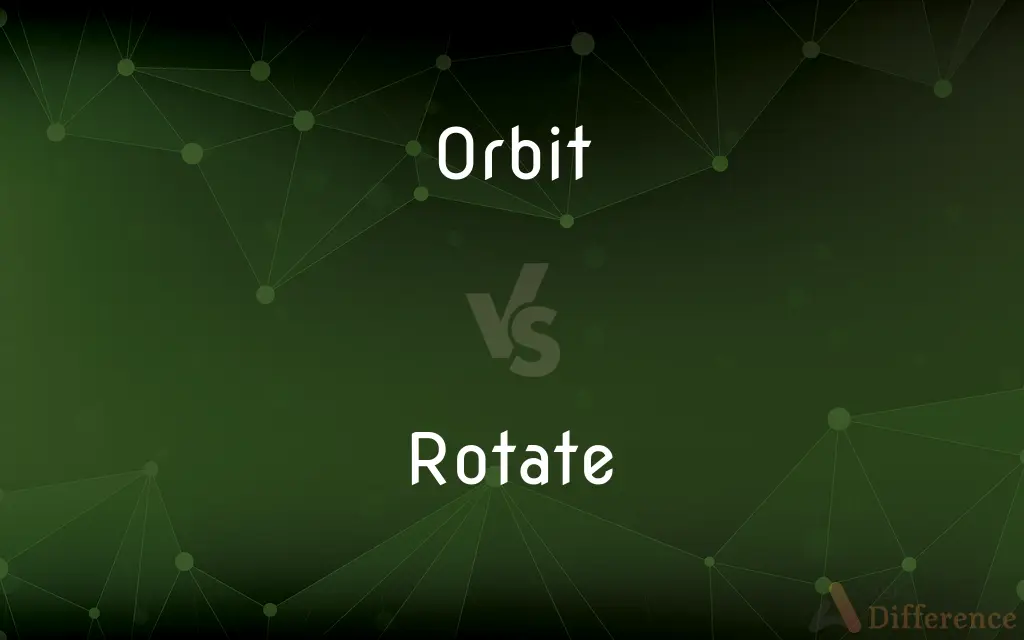Orbit vs. Rotate — What's the Difference?
Edited by Tayyaba Rehman — By Urooj Arif — Updated on April 5, 2024
Orbit involves a body traveling around another body in space due to gravitational pull, whereas rotation refers to an object spinning on its axis.

Difference Between Orbit and Rotate
Table of Contents
ADVERTISEMENT
Key Differences
Orbit is the path that an object in space follows as it moves around another object due to the influence of gravity. For instance, Earth orbits the Sun once every 365.25 days, guided by gravitational forces. On the other hand, rotation refers to the spinning movement of an object around its own axis. Earth completes one rotation on its axis approximately every 24 hours, resulting in day and night.
While orbiting is a movement influenced by the gravitational pull between two bodies, rotation is an internal movement that does not necessarily depend on another body's gravity. The Moon orbits Earth, showing the same face due to its synchronous rotation, whereas Earth's rotation on its axis causes the alternation between day and night.
Orbiting is essential for understanding the dynamics of celestial bodies and their positions relative to each other. It explains the seasonal changes we experience on Earth as it orbits the Sun at a tilted angle. Conversely, rotation plays a crucial role in determining the length of a day, affecting the climate and weather patterns due to the uneven heating of Earth's surface.
The speed and direction of orbit can vary greatly depending on the masses of the objects involved and their distance from each other. For example, Pluto takes 248 Earth years to complete one orbit around the Sun, whereas rotation speeds can be much faster or slower, independent of orbital speed, as seen in Jupiter's rapid rotation of approximately 10 hours.
Orbiting and rotating are fundamental motions in astronomy that have distinct characteristics and implications. The Earth's orbit around the Sun is responsible for the change in seasons, while its rotation causes the daily cycle of daylight and darkness, affecting life on Earth in numerous ways.
ADVERTISEMENT
Comparison Chart
Definition
Movement of one object around another due to gravitational forces.
Spinning of an object around its own axis.
Influencing Factors
Gravitational pull between two bodies.
Internal forces and conservation of angular momentum.
Impact on Earth
Causes seasons due to Earth's orbit around the Sun.
Causes day and night due to Earth's rotation.
Duration
Can vary from hours to years depending on the objects involved.
Can vary widely; Earth rotates once every 24 hours.
Example
The Moon's orbit around Earth.
Earth's rotation on its axis.
Compare with Definitions
Orbit
Can be geostationary or elliptical.
Some satellites are in geostationary orbits to remain over a fixed point on Earth.
Rotate
Can occur without orbiting.
A spinning top rotates on its axis without orbiting anything.
Orbit
Depends on mass and distance.
The gravitational pull between the Earth and the Moon defines the Moon's orbit.
Rotate
Is independent of orbital motion.
While the Earth orbits the Sun, it also rotates independently on its axis.
Orbit
Path of one object around another.
The Earth's orbit around the Sun is slightly elliptical.
Rotate
Leads to day and night.
Earth's rotation on its axis causes the alternation of day and night.
Orbit
Influenced by gravity.
Comets follow elongated orbits around the Sun due to gravitational interactions.
Rotate
Speed varies among planets.
Venus rotates very slowly, taking about 243 Earth days to complete one rotation.
Orbit
Varies in duration.
Mercury completes an orbit around the Sun in about 88 Earth days.
Rotate
Spinning around an axis.
Jupiter rotates so rapidly that it completes one rotation in just under 10 hours.
Orbit
In physics, an orbit is the gravitationally curved trajectory of an object, such as the trajectory of a planet around a star or a natural satellite around a planet. Normally, orbit refers to a regularly repeating trajectory, although it may also refer to a non-repeating trajectory.
Rotate
To turn around on an axis or center.
Orbit
The curved path of a celestial object or spacecraft round a star, planet, or moon, especially a periodic elliptical revolution
The Earth's orbit around the sun
Rotate
To proceed in sequence; take turns or alternate
Interns will rotate through the various departments.
Orbit
An area of activity, interest, or influence
Audiences drawn largely from outside the Party orbit
Rotate
To cause to turn on an axis or center.
Orbit
The cavity in the skull of a vertebrate that contains the eye; the eye socket.
Rotate
To plant or grow (crops) in a fixed order of succession.
Orbit
(of a celestial object or spacecraft) move in orbit round (a star or planet)
Mercury orbits the Sun
Rotate
To cause to alternate or proceed in sequence
The coach rotates her players frequently near the end of the game.
Orbit
The path of a celestial body or an artificial satellite as it revolves around another body due to their mutual gravitational attraction.
Rotate
Having radiating parts; wheel-shaped.
Orbit
One complete revolution of such a body.
Rotate
(intransitive) To spin, turn, or revolve.
He rotated in his chair to face me.
The earth rotates.
Orbit
The path of a body in a field of force surrounding another body; for example, the movement of an atomic electron in relation to a nucleus.
Rotate
(intransitive) To advance through a sequence; to take turns.
The nurses' shifts rotate each week.
Orbit
A range of activity, experience, or knowledge.
Rotate
To lift the nose during takeoff, just prior to liftoff.
The aircraft rotates at sixty knots.
Orbit
A range of control or influence
"What magnetism drew these quaking ruined creatures into his orbit?" (Malcolm Lowry).
Rotate
(transitive) To spin, turn, or revolve something.
Rotate the dial to the left.
Orbit
Either of two bony cavities in the skull containing an eye and its external structures. Also called eye socket.
Rotate
(transitive) To advance something through a sequence; to allocate or deploy in turns.
Orbit
To move in an orbit.
Rotate
(transitive) To replace older materials or to place older materials in front of newer ones so that older ones get used first.
The supermarket rotates the stock daily so that old foods don't sit around.
Orbit
To revolve around (a center of attraction)
The moon orbits Earth.
Rotate
(transitive) To grow or plant (crops) in a certain order.
Orbit
To put into an orbit
The space agency orbited a new satellite.
Rotate
Having the parts spreading out like a wheel; wheel-shaped.
A rotate spicule or scale; a rotate corolla
Orbit
(astronomy) A circular or elliptical path of a celestial object or spacecraft around a star, planet, moon, or Lagrange point, especially a periodic elliptical revolution.
Rotate
Having the parts spreading out like a wheel; wheel-shaped; as, a rotate spicule or scale; a rotate corolla, i.e., a monopetalous corolla with a flattish border, and no tube or a very short one.
Orbit
One complete circuit round an orbited body.
The Moon's orbit around the Earth takes nearly one month to complete.
Rotate
To turn, as a wheel, round an axis; to revolve.
Orbit
(uncountable) The state of moving in an orbit.
Rotate
To perform any act, function, or operation in turn, to hold office in turn; as, to rotate in office.
Orbit
(physics) The path of an electron around an atomic nucleus.
Rotate
To cause to turn round or revolve, as a wheel around an axle.
Orbit
(pinball) A path for the ball on the outer edge of the playfield, usually connected so that the ball entering in one end will come out of the other.
Rotate
To cause to succeed in turn; esp., to cause to succeed some one, or to be succeeded by some one, in office.
Orbit
A sphere of influence; an area or extent of activity, interest, or control.
In the post WWII era, several eastern European countries came into the orbit of the Soviet Union.
The convenience store was a heavily travelled point in her daily orbit, as she purchased both cigarettes and lottery tickets there.
Rotate
Turn on or around an axis or a center;
The Earth revolves around the Sun
The lamb roast rotates on a spit over the fire
Orbit
(anatomy) The bony cavity in the skull of a vertebrate containing the eyeball.
Rotate
Exchange on a regular basis;
We rotate the lead soprano every night
Orbit
(zoology) The area around the eye of a bird or other animal.
Rotate
Cause to turn on an axis or center;
Rotate the handle
Orbit
(mathematics) A collection of points related by the evolution function of a dynamical system. Category:en:Curves
Rotate
Perform a job or duty on a rotating basis;
Interns have to rotate for a few months
Orbit
The subset of elements of a set X to which a given element can be moved by members of a specified group of transformations that act on X.
Rotate
Turn outward;
These birds can splay out their toes
Ballet dancers can rotate their legs out by 90 degrees
Orbit
(informal) A state of increased excitement, activity, or anger.
Dad went into orbit when I told him that I'd crashed the car.
Rotate
Plant or grow in a fixed cyclic order of succession;
We rotate the crops so as to maximize the use of the soil
Orbit
(astronomy) To circle or revolve around another object or position.
The Earth orbits the Sun.
The satellite orbits the Lagrange point.
Orbit
To place an object (e.g. a satellite) into an orbit around a planet.
A rocket was used to orbit the satellite.
Orbit
To move around the general vicinity of something.
The harried mother had a cloud of children orbiting her, begging for sweets.
Orbit
To move in a circle.
Orbit
(transitive) To center (around).
Orbit
To continue to follow and/or engage with someone via social media after breaking up with them.
Orbit
The path described by a heavenly body in its periodical revolution around another body; as, the orbit of Jupiter, of the earth, of the moon.
Orbit
An orb or ball.
Roll the lucid orbit of an eye.
Orbit
The cavity or socket of the skull in which the eye and its appendages are situated.
Orbit
The skin which surrounds the eye of a bird.
Orbit
The (usually elliptical) path described by one celestial body in its revolution about another;
He plotted the orbit of the moon
Orbit
A particular environment or walk of life;
His social sphere is limited
It was a closed area of employment
He's out of my orbit
Orbit
An area in which something acts or operates or has power or control:
The range of a supersonic jet
The ambit of municipal legislation
Within the compass of this article
Within the scope of an investigation
Outside the reach of the law
In the political orbit of a world power
Orbit
The path of an electron around the nucleus of an atom
Orbit
The bony cavity in the skull containing the eyeball
Orbit
Move in an orbit;
The moon orbits around the Earth
The planets are orbiting the sun
Electrons orbit the nucleus
Common Curiosities
Why do we have day and night?
Day and night are caused by Earth's rotation on its axis, exposing different parts of the planet to sunlight.
Can an object orbit and rotate at the same time?
Yes, many celestial bodies, including Earth, both orbit around another body and rotate on their own axis.
What is an orbit?
An orbit is the path one object takes around another due to the gravitational pull between them.
What does it mean to rotate?
To rotate means to spin around an internal axis; it's a movement that an object makes around its own center.
How does Earth's orbit affect seasons?
Earth's orbit around the Sun, combined with its tilted axis, causes seasonal changes.
Do all moons orbit in the same direction?
Most moons orbit in the same direction their planets rotate, but there are exceptions due to unique gravitational interactions.
What determines the speed of an orbit?
The speed of an orbit is determined by the gravitational pull between the two objects and their distance from each other.
What's the difference between a geostationary orbit and a polar orbit?
A geostationary orbit keeps a satellite over the same point on Earth, whereas a polar orbit passes over the planet's poles, covering different areas over time.
Why does the Moon always show the same face to Earth?
The Moon's rotation period is synchronized with its orbit around Earth, a state known as synchronous rotation.
How do orbits affect satellite communication?
The type of orbit determines a satellite's coverage area and the duration it can communicate with any point on Earth.
What influences the rotation speed of a planet?
A planet's rotation speed can be influenced by its mass, composition, and any external forces it might have experienced during its formation.
Share Your Discovery

Previous Comparison
Fun vs. Folly
Next Comparison
Lint vs. FuzzAuthor Spotlight
Written by
Urooj ArifUrooj is a skilled content writer at Ask Difference, known for her exceptional ability to simplify complex topics into engaging and informative content. With a passion for research and a flair for clear, concise writing, she consistently delivers articles that resonate with our diverse audience.
Edited by
Tayyaba RehmanTayyaba Rehman is a distinguished writer, currently serving as a primary contributor to askdifference.com. As a researcher in semantics and etymology, Tayyaba's passion for the complexity of languages and their distinctions has found a perfect home on the platform. Tayyaba delves into the intricacies of language, distinguishing between commonly confused words and phrases, thereby providing clarity for readers worldwide.















































